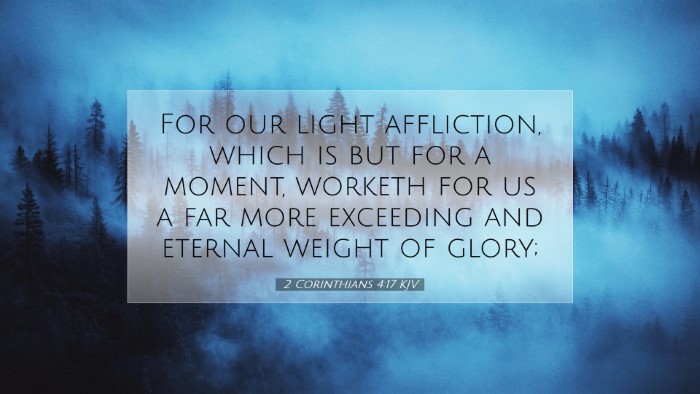Commentary on 2 Corinthians 4:17
Verse Reference: 2 Corinthians 4:17 - "For our light affliction, which is but for a moment, worketh for us a far more exceeding and eternal weight of glory."
Introduction
The Apostle Paul, in 2 Corinthians 4:17, reminds the believers of the temporary nature of their sufferings in contrast to the eternal glory that is to come. This passage serves as a profound encouragement for Christians enduring hardships, providing a divine perspective that emphasizes hope amidst trials.
Exposition
This verse begins with the word "For," indicating that Paul is building upon his previous arguments in the chapter regarding the sufferings endured for the sake of Christ. He connects the afflictions faced by believers to a greater purpose, highlighting the theological implications of suffering in the Christian life.
1. Light Affliction
Paul characterizes the tribulations of life as "light affliction." In this context, he is not minimizing the actual pain and struggles faced by believers but is rather contrasting the temporary nature of these sufferings with the permanence of eternal glory.
- Matthew Henry notes that Paul uses the term "light" not because afflictions are insignificant, but to convey that, when viewed in the light of eternity, they pale in comparison to the eternal joy that awaits us.
- Albert Barnes emphasizes that this "light affliction" is relative and should be understood in the context of burden and weight. Suffering for Christ's sake holds a unique significance that is often misunderstood.
- Adam Clarke elaborates on the definition of "affliction," explaining that it can include persecution, loss, and personal distress, all of which Paul faced as part of his ministry.
2. Momentary Nature
The phrase "which is but for a moment" speaks to the transitory character of earthly sufferings. The Apostle is reminding the Corinthians of the fleeting nature of their current struggles, encouraging them to have an eternal perspective.
- Matthew Henry explains that this temporal aspect of suffering serves to remind the believer of the hope that comes from understanding that these trials will eventually cease.
- Albert Barnes reflects on how trials serve as a temporary experience in the believer’s life, further reinforcing that they can be borne with grace and fortitude in the present age.
3. The Weight of Glory
Paul contrasts "light affliction" with a "far more exceeding and eternal weight of glory." This phrase is a powerful paradox that encapsulates the transformative nature of Christian suffering, suggesting that while we may face trials, they serve a greater purpose in preparing us for the glory that is to come.
- Adam Clarke describes the "weight of glory" as an immeasurable magnitude that far surpasses any earthly regret or sorrow we might endure.
- Albert Barnes posits that this weight of glory refers to the intrinsic value and significance of the rewards that await believers, which far outweighs any temporal loss.
Theological Implications
Understanding 2 Corinthians 4:17 is crucial for a robust Christian theology of suffering. The Apostle Paul’s insights help believers navigate their pain through a lens of hope and expectation.
- Endurance in Suffering: The passage speaks to the necessity of enduring trials, with the assurance that God is at work preparing something far greater.
- The Purpose of Suffering: Suffering is not in vain; rather, it has a divine purpose. Paul outlines an active process through which believers are shaped and refined for eternal glory.
- Hope for the Future: The "eternal weight of glory" is a fundamental tenet of Christian faith, underscoring the belief that physical realities are not all that there is. There exists a glorious future that awaits every believer.
Pastoral Applications
For pastors and leaders, this verse offers significant pastoral insights and applications:
- Encouragement for the Afflicted: Use this verse to remind those who are suffering of the temporary nature of their struggles and the glory they can expect to receive.
- Teaching on Suffering: Incorporate discussions about the nature of suffering into sermons, highlighting that it serves a critical role in spiritual formation.
- Building a Culture of Hope: Foster a community that understands and embraces the hope found in Christ, even amidst difficulties.
Conclusion
2 Corinthians 4:17 serves as a beacon of hope for all believers facing trials. Paul masterfully juxtaposes affliction with the promise of eternal glory, inviting Christians to view their struggles through a divine lens. By understanding the temporary nature of suffering and the profound significance of the glory to come, believers can endure with patient hope and unwavering faith.


